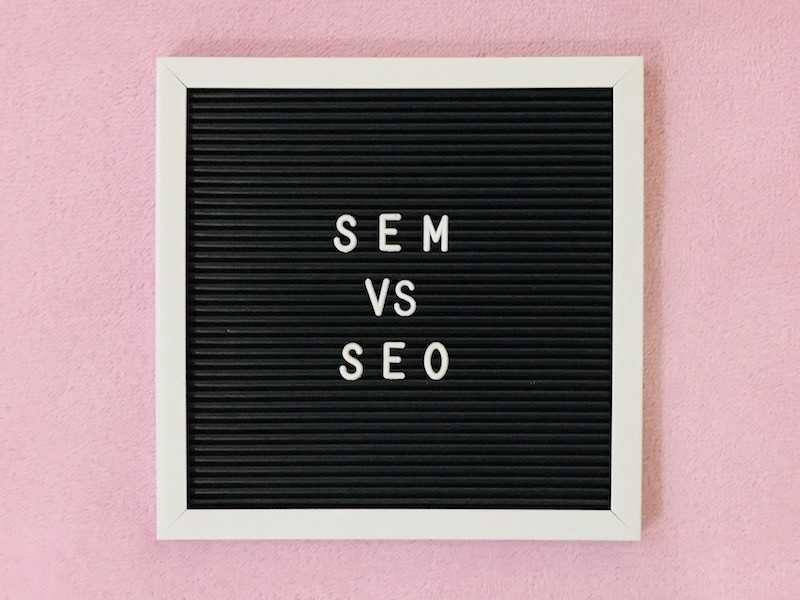As a business owner, online traffic is one of the most important things in order to grow your business and audience. Arguably one of the most effective ways to boost your search engine results ranking is to implement proven and effective search engine marketing strategies. By understanding the way search engine marketing works and implementing it alongside your other marketing strategies, you will be able to grow your business.
With millions of businesses out there wanting to have the same or similar audience and consumer base as you, it has never been more important to advertise online, and search engine marketing is the most effective way to promote your products and grow your business. In this article, you will learn what search engine marketing is, how it works, SEO vs. SEM, and the structure of ad auctions within search engine marketing.
Table of Contents
What is Search Engine Marketing?
Search engine marketing, or SEM, is one of the most effective ways to grow your business in an increasingly competitive marketplace. Search engine marketing, which is often referred to as search advertising, is the practice of marketing a business using paid advertisements that appear on search engine results pages (or SERPs). Advertisers bid on keywords that users of services such as Google and Bing might enter when looking for certain products or services. Identifying these keywords give advertisers the opportunity for their ads to appear alongside results for those search queries.
These ads, most commonly known by the term pay-per-click ads, come in a variety of formats. Some are small, text-based ads, whereas others, such as product listing ads are more visual. Product-based advertisements allow customers to see important information at a glance, such as price and reviews. The greatest strength of search engine marketing is that it offers advertisers the opportunity to put their ads in front of motivated customers who are ready to buy at the precise moment they’re ready to make a purchase. Search engine marketing is an effective and powerful way to grow your business.
How SEM Works
Search engines use complicated algorithms to ensure that the most relevant results are returned for each search, including location and other available information. In paid search advertising, sponsored ads appear at the top of and on the side of search engine results pages to gain more visibility and prominence than the organic results.
For example, if you are a customer looking for a product or service online, you go to a search engine and type in your search terms (also known as keywords). In your search results pages, you will come across various company ads whose keywords match the keywords in your search. These ads appear in prominent locations on the page, along with the other search listings that match your keywords. The paid listings are highly relevant to your specific search, making it likely that you will click on them.

Starting SEM
SEM networks are self-service operations. Once a marketer selects a network, they can get a campaign up within a short period of time. When setting up a campaign with an SEM, the marketer is prompted to:
- Conduct keyword research and select a set of keywords related to their website or product
- Select a geographic location for the ad to be displayed within
- Create a text-based ad to display in the search results
- Bid on a price they are willing to pay for each click on their ad
Text-only ads are easy to produce. Marketers enter a headline, text for the body of the ad, a call-to-action and a URL for the hyperlink. Search engine marketing is considered by many to be the most efficient way to spend marketing dollars.
SEO vs. SEM
Generally speaking, “search engine marketing” refers to paid search marketing. This is a system where businesses pay Google to show their ads in the search results. Search engine optimization, or SEO, is different because businesses don’t pay Google for traffic and clicks. Instead, they earn a free spot in the search results by having the most relevant content for a given keyword search. Both SEO and SEM should be fundamental parts of your online marketing strategy. SEO is a powerful way to drive traffic, while search engine advertisements are a highly cost effective way to drive conversions at the bottom of the funnel.
Keywords Are The Foundation of Search Engine Marketing
Keywords are the foundation of search engine marketing. As users enter keywords as a part of their search queries into search engines to find what they’re looking for, it’s not surprising that the most important part of search engine marketing as an advertising strategy is keywords.

SEM Keyword Search
Before you choose which keywords to use in your search engine marketing campaigns, you need to conduct comprehensive research as part of your keyword management strategy.
First you need to identify the keywords that are relevant to your business. They should also be terms that prospective customers are likely to use when searching for your products and services. One way to accomplish this is by using tools like WordStream’s Free Keyword Tool. Using a tool like this will allow you to see a range of valuable information, such as search volume for each individual keyword in Google and its general competitiveness.
In addition to helping you find keywords you should be bidding on, thorough keyword research can also help you identify negative keywords. These are search terms that you should exclude from your campaigns. Negative keywords aren’t terms with negative connotations, but rather irrelevant terms that are highly unlikely to result in conversions. This concept is known as search intent, or the likelihood that a prospect will complete a purchase or other desired action after searching for a given term. Some keywords are considered to have high commercial intent, or a strong indication that the searcher wants to buy something. Some examples of high commercial intent keywords include the following:
- Buy
- Discount(s)
- Deal(s)
- Coupon(s)
- Free shipping
Keywords and Account Structure
Another crucial aspect of keywords that is essential for the success of a search engine marketing campaign is account structure. Logical keyword grouping and account structure can help you achieve higher click-through rates, lower costs-per-click, and generally stronger overall performance. Keyword research can help you think about how to best structure your account. An optimally structured account is comprised of five distinct elements:
- Ad campaigns
- Ad groups
- Keywords
- Ad text
- Landing pages
Ad campaigns can, and should in many cases, focus on similar products or services. Ad groups allow for each campaign to be further subcategorized for relevance.

The Search Engine Marketing Ad Auction
One of the most common misconceptions about search engine marketing is that whomever has the largest advertising budget wins. While a larger advertising budget can certainly be advantageous, especially when targeting highly competitive keywords, it’s far from a requirement for success with search engine marketing. This is because all ads go through a process known as the ad auction before appearing alongside search results.
How the Ad Auction Works
The ad auction process takes place every single time someone enters a search query into Google. To be entered into the ad auction, advertisers identify keywords they want to bid on, and state how much they are willing to spend per click to have their ads appear alongside results relating to those keywords. If Google determines that the keywords you have bid on are contained within a user’s search query, your ads are entered into the ad auction.
How Ads Win the Ad Auction
Not every single ad will appear on every single search. This is because the ad auction takes a variety of factors into account when determining the placement of ads on the SERP. Not every keyword has sufficient commercial intent to justify displaying ads next to results. However, the two main factors that Google evaluates as part of the ad auction process are your maximum bid and the Quality Score of your ads.
Maximum bid is the maximum amount you have specified you are willing to pay for a click. Quality Score is a metric based on the overall quality of your advertisement. Google calculates these metrics during the ad auction to determine the placement of the advertisement. The result of this calculation is known as the ad rank.

The Importance of Quality Score in SEM
Given that Google AdWords’ Quality Score comprises half of the ad rank formula, it is one of the most crucial metrics search engine marketers can focus on. High Quality Scores can help you achieve a better ad position at a lower cost because Google favors ads that are highly relevant to user queries.
Start Using Search Engine Marketing Strategies Today!
Implementing search engine marketing strategies along with your other marketing strategies will allow your business to flourish online. If you want to learn more about search engine marketing strategies, contact us today!
FAQ:
- What is SEM?
- What is search engine optimization?
- How important is account structure?
- How do ad auctions work?
- What are negative keywords?



Contact Us Today!